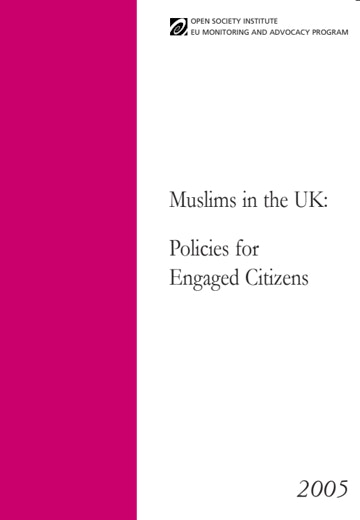Greater government recognition of the needs of British Muslims is required to tackle the disadvantage, deprivation, and discrimination that this community faces, says the OSI report Muslims in the UK: Policies for Engaged Citizens.
Presenting new analysis and data, the report, published by OSI's EU Monitoring and Advocacy Program, makes the case that religion is a more important aspect of identity than ethnicity for British Muslims. Currently both data collection and government policy too often address minority issues only through the lens of ethnicity. Muslims in the UK makes detailed, practical recommendations aimed at seeing that government policy more effectively meets the needs of Muslims as a group.
The report focuses on four key policy areas: employment, education, the criminal justice system, and equality and community cohesion.
The chapter on employment highlights the disproportionately high rate of unemployment among UK Muslims and the over-concentration of Muslims in low-paying sectors. It also finds that Muslim women recorded the highest level of economic inactivity among all faith groups and that Muslim youth are at increasing risk of social exclusion.
Muslims in the UK reveals low levels of confidence in the criminal justice system prevalent among British Muslims, and the impact of anti-terrorism laws in fueling a perception of unfair treatment. Key educational concerns for Muslim parents include their children's poor (although improving) academic results; the need to eradicate racism and Islamophobia; and the lack of recognition or support of their children’s religious identity.
The report makes the following recommendations:
- improved data collection on the basis of faith (as well as ethnicity);
- increased engagement by government agencies and public bodies, in particular criminal justice agencies, with Muslim communities;
- the need for policy makers to design targeted policy to tackle the socioeconomic disadvantage faced by Muslims and to ensure their full integration into the labor market;
- the need to incorporate knowledge and understanding of Muslims and their faith in the education curriculum;
- more research on the specific needs of British Muslims.
The report was edited by OSI-UK Muslims Research Project Director Tufyal Choudhury. The authors are Zamila Bunglawala (labor market analyst), Dr. Basia Spalek (University of Birmingham), Prof. Mark Halstead (Plymouth University) and Maleiha Malik (Kings College, University of London).
Muslims in the UK: Policies for Engaged Citizens is available for download in PDF format.
Download
-
Muslims in the UK: Policies for Engaged Citizens (1.64 Mb pdf file)
Download the complete 344-page report.
